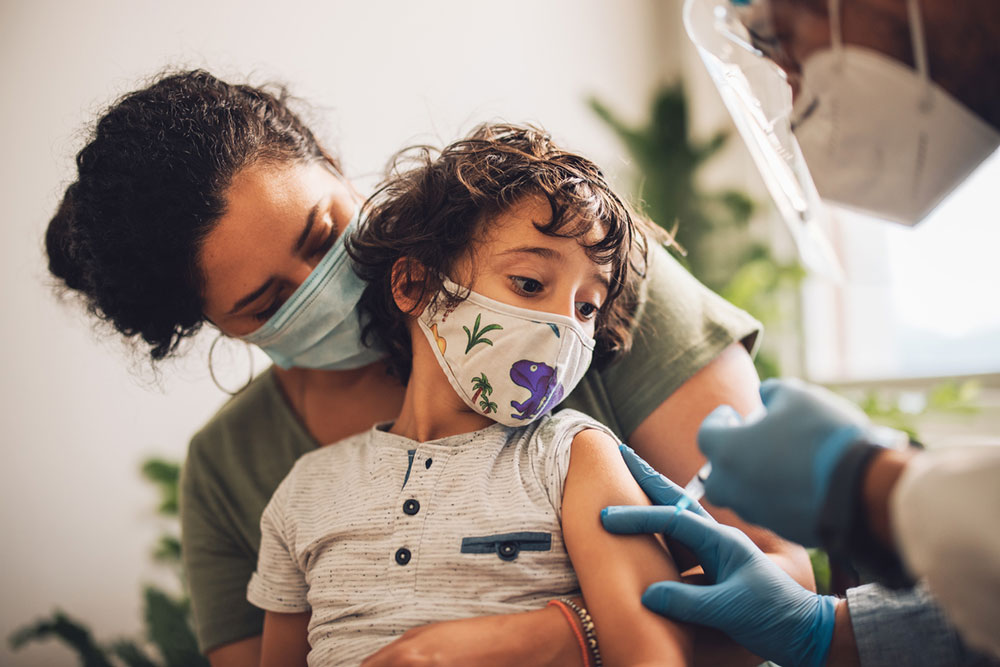Nearly One-Third of 5- to 11-Year-Olds Are Getting Vaccinated
But worrying trends seen in parental enthusiasm for COVID vaccines and teen vaccinations
Get all our news
These trends are particularly concerning given the outbreaks we are seeing throughout the country.”
James Druckman
IPR political scientist

Parents who are Democrats, college-educated, city dwellers, and older (over age 35) were more likely to say their 5- to 11-year-olds were getting vaccinated over those who were not, according to a new survey by researchers at Northwestern, Harvard, Rutgers, and Northeastern.
But the survey also revealed worrying trends in vaccinating children who are now eligible for COVID-19 vaccines, including America’s 28 million 5- to 11-year-olds, who were just cleared to receive the Pfizer-BioNTech vaccine on November 2.
Of parents of 5- to 11-year-olds, 27% said their children had received at least one dose of the vaccine. But since June, the number of overall “vaccine-enthusiastic” parents—those who had or said they were likely to get their children vaccinated no matter their age—dropped by 7 percentage points from 64% to 57%.
The researchers also found that vaccinations for 12- to 18-year-olds had stalled between September and November, only inching up 1 percentage point from 54% to 55%.
The nationally representative survey took place between November 3 and December 2, and roughly 6,000 parents of children up to age 18 participated.
“These trends are particularly concerning given the outbreaks we are seeing throughout the country,” said IPR political scientist James Druckman, one of the researchers involved with the survey.
Some of the same demographic trends seen in previous COVID States surveys around vaccinations seem to be holding here as well:
- The biggest gap (15 percentage points) was seen between parents living in cities and those in rural areas. Urbanites were nearly twice as likely (32%) to say they had vaccinated their children between the ages of 5 and 11 versus just 17% of those living in rural areas.
- College-educated parents are the most “vaccine enthusiastic” group overall, with around 80% consistently saying since February 2021 that they either had vaccinated or were likely to vaccinate their children.
- Of parents who said they intended to vaccinate their 5- to 11-year-olds, 43% said they would do it “right away” versus 32% who are taking a “wait-and-see” approach.
- Of all the race and ethnicity groups, Black parents overall expressed the lowest level of vaccine enthusiasm for their children no matter their age, dropping from 59% in June to 50% in November.
- For younger children, Black parents were the least likely to say they were vaccinating them (21%) and Hispanic parents the most likely (30%), versus 27% for White and Asian parents.
- For children aged 12 to 18, the percentages of Hispanic and Asian parents saying they were likely to (or already had) vaccinated their children have increased or remained steady over time, around 62% and 76% in November and up from 52% and 70% in February, respectively.
- Two-thirds of parents (66%) who identify as Democrats reported getting the vaccines for their 12- to 18-year-olds versus 46% of parents who identify as both Republican and Independent.
- Parents living in the Northeast (63%) were the most likely to have vaccinated or say they would vaccinate their children versus roughly only 50% of parents in the Midwest, the lowest of all U.S. regions.
Read the report about parents' attitudes on vaccinating their children.
James Druckman is the Payson S. Wild Professor of Political Science and IPR associate director and fellow.
Photo credit: iStock
Published: December 17, 2021.


